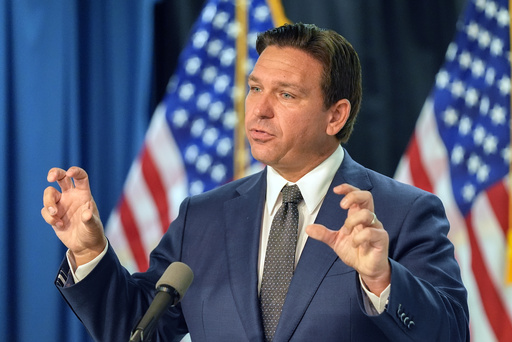TALLAHASSEE, Fla. — With the 2028 presidential primary approaching, Florida Governor Ron DeSantis is making a concerted effort to win back supporters of the Republican frontrunner he previously challenged. His strategy heavily revolves around President Donald Trump’s signature issue: immigration.
However, DeSantis faces a significant challenge as many Republicans in his own state believe they are more attuned to Trump than he is. A week ago, he convened lawmakers for a special legislative session with the aim of passing several controversial border-related initiatives. These included criminal charges for officers who fail to enforce immigration laws and various restrictions on sending money abroad to family members.
As soon as the session commenced, legislators rejected many of DeSantis’ proposals, opting instead to introduce their own legislation. This new bill, titled the Tackling and Reforming Unlawful Migration Policy, or TRUMP, Act, strips much of DeSantis’ control over immigration enforcement and delegates that authority to the state agriculture commissioner.
The ongoing clash highlights DeSantis’s difficulties as he seeks to regain prominence after his failed attempt at the presidency during his initial campaign. Previously successful in transforming Florida from a swing state to a solid Republican stronghold, DeSantis won reelection by a substantial margin. Yet, he struggles to recapture the political clout he had before challenging Trump, a situation aggravated by his limited rapport with state lawmakers.
“This is a relationship business,” noted a Republican political consultant, emphasizing DeSantis’s shortcomings in fostering connections. The governor’s office has not commented on these developments.
In 2023, during his presidential bid, DeSantis promoted himself as a bold leader capable of outshining Trump. His administration was credited with multiple legislative successes in Florida, often utilizing his veto powers to maintain legislative control. However, support for his presidential ambitions faded significantly after he faced considerable defeat in the Iowa caucuses.
The Republican Party of Florida recently decided not to require presidential primary participants to pledge support for the nominee, ensuring that Trump would not have to back DeSantis amidst their fierce competition. Despite enduring criticism from Trump, the two reached a tentative truce last May, with DeSantis helping to raise funds for Trump’s campaign.
By December, there was speculation about DeSantis being considered for a leadership role in Trump’s administration. Despite winning the support of many lawmakers, DeSantis’s reluctance to engage in the typical political maneuvering is perceived to be a disadvantage. Comparatively, Trump is known for his personal engagement, regularly reaching out to lawmakers and maintaining close ties with potential allies.
DeSantis’s recent announcement for a special session reportedly took lawmakers by surprise. House Speaker Daniel Perez expressed frustration, stating, “I called him immediately… He didn’t answer.”
Former ally State Senator Randy Fine, who has since endorsed Trump, highlighted the divergence in loyalty from lawmakers. Fine shared that while he had been loyal to DeSantis, he is now attacking those still aligned with the governor as “Republicans in name only,” or RINOs. He expressed a sense of betrayal felt by legislators who once supported DeSantis.
In the fight over Florida’s immigration policies, both DeSantis and lawmakers believe they represent Trump’s ideals. DeSantis criticized the legislature’s bill as a betrayal and labeled it merely as cosmetic changes rather than a substantive solution. He asserted that transferring immigration enforcement power to the agriculture commissioner would create a conflict of interest.
Conversely, legislative supporters of the TRUMP Act claim that the bill aligns with Trump’s objectives, with one of its sponsors stating that it aims to support the president’s policies. Reports indicate that Trump’s team had provided input on the proposed legislation, suggesting that the new bill met the administration’s approval criteria.
Some lawmakers supportive of DeSantis have begun to express favor for his immigration proposals. U.S. Representative Byron Donalds noted that while his relationship with DeSantis had become strained, he recently acknowledged that law enforcement powers are crucial for effective immigration measures.
Kevin Roberts, president of a conservative think tank, also voiced support for DeSantis’s initiatives, emphasizing the importance of robust immigration policies. Still, neither Trump nor the White House has taken an official stance on the issue at this point.
For now, DeSantis remains prominent in conservative media and social platforms, maintaining a visible presence. However, observers note that this visibility can diminish quickly, especially with evolving dynamics in the political landscape.
In summary, the ongoing tussle over immigration policy in Florida highlights the challenges DeSantis faces in solidifying his political influence within the Republican Party as he prepares for the upcoming presidential election.



